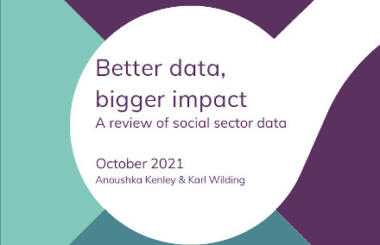There is too little comparable and accessible data about the charity sector, leading to poorer policies from government and others, according to a new paper.
Better Data, Bigger Impact: A Review of Social Sector Data, published last week by the Law Family Commission on Civil Society, calls for greater collaboration between charities and government departments to rectify the problem.
The report contrasts the amount, timeliness and quality of data gathered about the private sector with data gathered about the charity sector. It argues that this gap, between what policymakers know about businesses and charities, leads to the sector being overlooked.
“From coordinating emergency support to helping deliver the vaccine rollout, the social sector played a vital role in helping the country through Covid. It delivered where the private sector and government fell short,” the report says.
“But history may well tell another story: how, despite being critical to so much of the response, the social sector struggled to make a case for emergency support, trying to explain a business model where income dried up, but demand escalated. How the sector, at times, did not achieve its full potential when its capacity and reach remained poorly understood by many in government.”
Furthermore, the lack of timely data means “we have almost no idea how well prepared the social sector is for the future”.
The report also emphasises that better data about how the sector is performing will help charities themselves, as well as funders and government, understand what is working well and where to prioritise.
Recommendations
There are five main recommendations in the report.
- Produce social economy satellite accounts so that the Office for National Statistics releases regular updates about the sector’s contribution to the economy.
- Better use of existing administrative and survey data that covers the social sector.
- Publish regular, timely indicators on the social sector so there are up-to-date figures on sector finances and organisational births and deaths.
- Modernise how data is gathered, for example through digitising PDFs that are not machine-readable.
- Establish a cross-sector Social Sector Data Standards and Coordination Working Group. The report suggests this should be co-funded by the government and charity sector.
‘This can be done’
Charities emphasised the importance of collaboration to produce data that was useful to everyone who needed it.
Anoushka Kenley, research and policy director at Pro Bono Economics, highlighted the lack of granular data about how much public funding the sector receives or how many people volunteer for different types of causes.
“The pandemic reminded us all of the extraordinary reach and impact of the social sector in the UK. But at the same time, the upheaval of the pandemic brought into focus a serious data gap that has long dogged the sector and created a blind spot for government.
“Filling this data gap can be done and would go a long way to freeing the social sector to deliver even more impact than it already does. It requires the sector itself to take an active role but it also relies on leadership from government.
Sarah Vibert, interim CEO of NCVO, added: “This report should be a roadmap for action. DCMS, NCVO and national infrastructure organisations have identified strengthening the evidence and data on the social sector as a shared priority.
“Many of the challenges and opportunities highlighted in the report are longstanding and well-known: now is the time for us to act. NCVO is willing and ready to play whatever role is of most value to do this.
“We need to significantly improve data about, for, and from the social sector. As the report notes, better data isn't just about better policy or stronger organisations; it is about communities being better served by charities, social enterprises, and public services.”
Related articles












